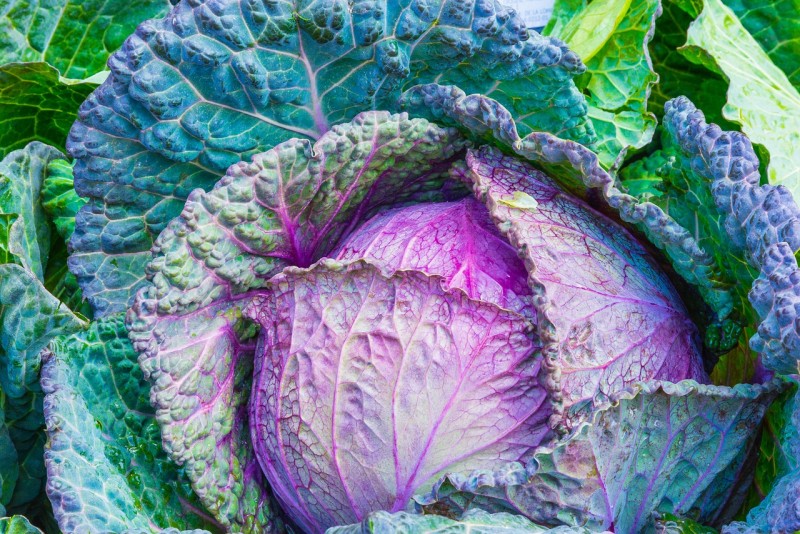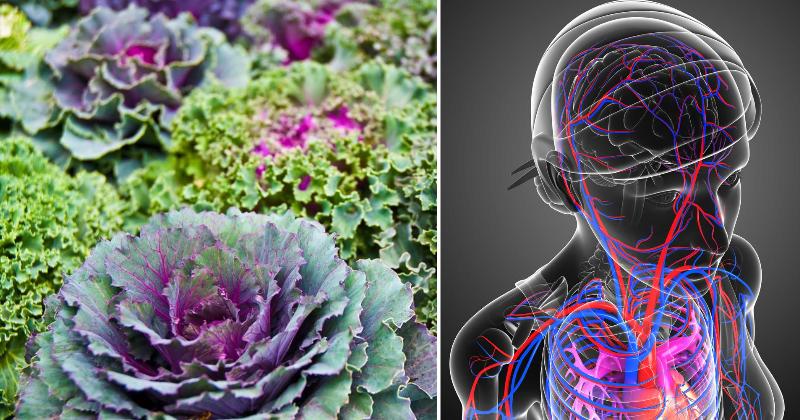If it looks like lettuce and feels like lettuce… it just might be cabbage. Because of this, many lump cabbage into the lettuce category. But cabbage is actually part of the cruciferous vegetable family, along with kale and broccoli. That fact alone should give you a reason to add cabbage to your diet.
Like lettuce, cabbage can vary in color from green to red or purple, and the leaves may be smooth or crinkled. But with less than 20 calories per half cup cooked as well as the many nutrients it has to offer, cabbage is worth adding to your diet!
The health benefits of cabbage range from treatment for constipation, stomach ulcers, headaches, and skin disorders to protection against Alzheimer’s disease, heart disease and aging. Who would’ve thought a few leaves could do all that?
Why Add Cabbage to Your Diet? Check out this list of health benefits!

1. Cancer Prevention
Cabbage contains two cancer-fighting compounds. The first is known as DIM. It’s been shown to help protect against cancer and lessen the harmful effects of radiation therapy. The second is called sulforaphane. Research has consistently shown that the sulfur-containing compounds in cruciferous vegetables that give them a bitter taste are also what give them their cancer-fighting power. Sulforaphane has shown promising results in testing conducted to study its ability to delay or impede different types of cancer, including melanoma, esophageal, prostate and pancreatic. In a study conducted at the University of Missouri, researchers found that a chemical in cabbage known as apigenin may decrease tumor size in an aggressive form of breast cancer.
2. Heart Health
The same compounds in cabbage that have been shown to help protect against cancer have also been shown to suppress harmful inflammation that may lead to cardiovascular disease. Researchers have found that the high polyphenol content in cabbage may also reduce the risk of cardiovascular disease, as it can aid in preventing buildup and reducing blood pressure.
3. Immunity and Digestion
You may have eaten cabbage in a fermented form such as sauerkraut. Fermented foods are full of probiotics that aid in maintaining a strong immune system and a healthy digestive system. The healthy microbes in fermented foods create an acidic environment, allowing vitamins and minerals to be easily absorbed by the body. The fiber and water content in cabbage also helps to keep the digestive tract clear and prevent constipation.
4. Brain Health
Cabbage is a powerful brain food due to the Vitamin K and anthocyanins it contains. Anthocyanins are primarily found in red cabbage, and they have been shown to help protect against liver injuries, reduce blood pressure, improve eyesight, have strong anti-inflammatory and antimicrobial properties, and they help to destroy free radicals in the body, before they can cause damage to cells. Anthocyanins help to fight off disease, improve the nervous system and increase brain function. Vitamin K has been shown to help prevent blood clots, support bone health, and it’s essential for protecting against nerve damage, improving the body’s defense against neural degeneration, Alzheimer’s disease and dementia.
5. Skin Care
The antioxidants found in cabbage including Vitamin C, anthocyanins and sulphur play a major role in skin health and protecting against the aging process. These antioxidants help fight off free radicals in the body, which cause cell damage and are an underlying cause of wrinkles, skin discoloration, skin spots and several other skin conditions. Consuming cabbage can boost the body’s defense against premature aging and keep skin looking young and healthy.
These benefits come from eating cabbage, but some swear by using cabbage leaves for external healing purposes. Some women use them to help reduce breast swelling and relieve pain from breastfeeding. Researchers aren’t sure if there is a property within cabbage that decreases pain and swelling, or if the swelling is reduced because the cabbage leaves are being used as a cold compress, but placing cabbage leaves on a swollen area can have soothing effects. This may also work with other parts of the body that are swollen, such as the feet, arms or legs.
Whether your goal is to use cabbage topically or internally, the health benefits it offers are undeniable. Check out the video below for more information and cooking tips!


